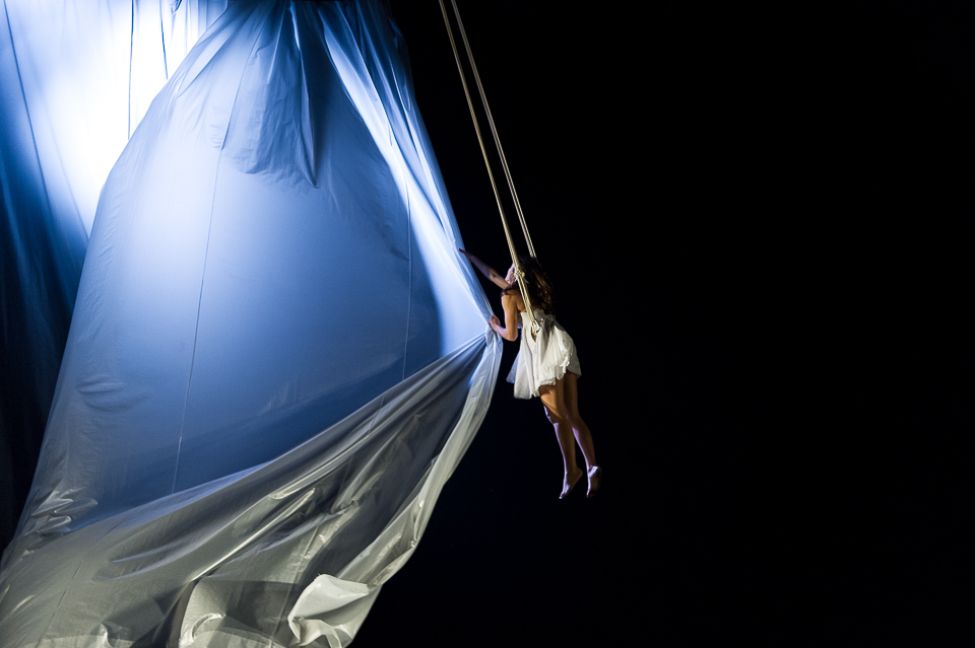A meditation on loss, ‘The Forgotten/L’Oublie(e)’ explores darkness on many levels.

On Thursday, Sept. 29, Peak Performances at Montclair State University began their 12th season with the American Premiere of Raphaelle Boitel in The Forgotten/L’Oublie(e). Boitel is well known in France as a circus performer and a contortionist. As a child she attended the National Circus School in Paris and studied with its founder Annie Fratellini. At 12 years old she began touring and spent 13 years with James Thierree’s company.
The Forgotten/L’Oublie(e) is Boitel’s first large-scale, independent work. She created, directed and performed in it alongside her brother, Silvert Boitel, sister, Alice Boitel and mother, Lilou Herin. Tristan Baudoin and Aloise Sauvage round out the cast.
Using music, dance and circus arts, The Forgotten/L’Oublie(e) is an expression of loss and desolation. Boitel lends her natural skills to this performance to tell the story in a very unique way. On bungee cord harnesses Boitel and Sauvage are able to use the whole space of the stage to express emotions, sometimes floating, sometimes flying, backward and forward and sideways. Wearing white against a dark stage, hair loose and flowing, they look very lovely and ethereal.
Their characters search endlessly for a man they have lost. Boitel created The Forgotten/L’Oublie(e) as a way of expressing the grief of losing an important male figure in her own life. The Forgotten/L’Oublie(e) opens with a solitary man on a dark stage. A female voice tells us he died. Then we see an emergency room scene in silhouette. This was strangely comical; in sharp contrast to the mostly forlorn feeling of the rest of the show. The narrator’s voice tells us that she longs to go where he has gone, so that she can come back. I took this to mean that she wants to come back whole and be able to start her life anew.
What follows is a series of vignettes that illustrate searching for a lost loved one. In one, a couple dances, but she seems to be wrestling with him, with his memory, not wanting to let him go, but also not wanting to face her future as a widow. An older version of herself, dressed in widow’s back, stares at her from the other side of the stage.
In another scene from The Forgotten/L’Oublie(e), a woman dressed in a wedding gown moves across the stage. She struggles to move forward but is forced back several times. When she gets far enough, we see that the man is sitting on the long train of her gown and she drags his weight with her wherever she goes.

We view many of these scenes from behind a thin veil covering the stage, so The Forgotten/L’Oublie(e) has a dream-like quality all the time, but occasionally the dream borders on nightmare. Such as when we hear an eerie rendition of the song, “Dream a Little Dream of Me” sung in a solitary voice coming out of the darkness.
Or, when it is snowing and three old-fashioned widows dressed all in black veils and gowns glide around on the stage on what must have been roller skates under their full, black skirts. This section was truly haunting and made me think of American Horror Story: Widows.
The show’s grieving quality does seem very fitting, though, for the month of September. With the 15-year anniversary of 9/11 still in recent memory, I felt darkness in more than a figurative sense. The darkness of the theater itself weighed on me throughout the performance. In addition, my dad passed away in the month of September, and I couldn’t help but see my mom, in the months and years following his death, in some of these vignettes.
At one point the stage flickers like an old movie reel, switching quickly from one performer to another in a rectangle of light, fast and changing, up in the air and then down on the ground. I sat in almost total darkness straining to see more clearly.
A rectangle of light finds three women of different ages. As we watch, the window of light gets smaller and smaller until it only shows us one of the woman’s eyes. I interpreted this as a widow’s world closing in on itself.
Carrie Urbanic and she is the Director of Cultural Engagement in the office said “I thought it like a darker version Cirque du Soleil.”
This solemn side to circus arts was startling, but intriguing as well. For all the sadness, I left the theater with a certain sense of relief and lightness. I hope that the creation of The Forgotten/L’Oublie(e) was as healing to Boitel as I think it was to those who experienced it.

You must be logged in to post a comment Login